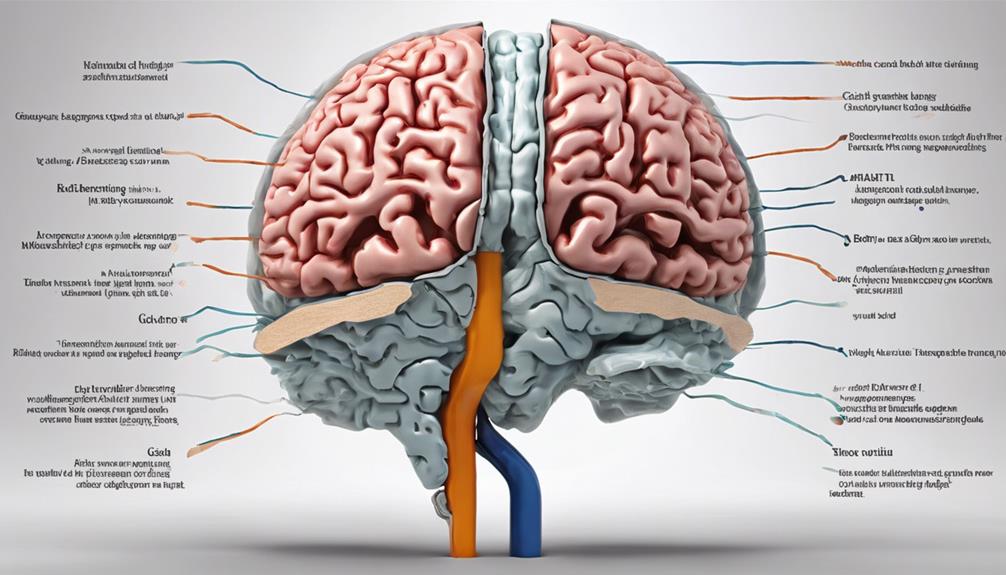Studying the complexities of brain health is like watching a intricate dance of neurons, where every move is essential to the final outcome.
Recently, a concerning correlation has emerged between gabapentin use and dementia risk. The data paints a picture of heightened vulnerability, prompting a closer examination of the interplay between these medications and cognitive decline.
As we explore the nuances of this connection, a deeper understanding may illuminate potential implications for patient care and future research directions.
Key Takeaways
- Gabapentin linked to increased dementia risk in older adults.
- Long-term use and high doses elevate dementia risk.
- Off-label gabapentinoid use may lead to cognitive decline.
- Monitoring crucial to address cognitive risks in gabapentin users.
Gabapentin’s Impact on Cognitive Health
Have the cognitive and functional status of older adults been significantly influenced by gabapentin use? Studies have indicated a concerning association between gabapentin use and cognitive decline in older adults. Measures such as CDRGLOB, CDRSUM, MMSE, and FAQ have shown changes in cognitive status among older individuals initiating gabapentin treatment. This decline in cognitive and functional status raises questions about the medication’s impact on cognitive health in the elderly population. The findings suggest a need for further research to comprehensively understand the potential negative effects of gabapentin on cognitive health in older adults.
Healthcare monitoring plays a crucial role in addressing the risks associated with gabapentin use. Careful observation of cognitive changes in older adults prescribed gabapentin is essential to mitigate any potential decline in cognitive function. By closely monitoring the cognitive and functional status of older individuals taking gabapentin, healthcare providers can better serve this population and ensure their cognitive health is safeguarded.
Understanding the Gabapentin-Dementia Link

Exploring the association between gabapentin use and the risk of dementia reveals a significant concern based on recent research findings. Studies have shown a potential link between gabapentinoids, including gabapentin, and an increased risk of cognitive decline and dementia in older adults. Some key points to consider include:
- A retrospective cohort study demonstrated a 1.45 hazard ratio for dementia in individuals exposed to gabapentin or pregabalin.
- Gabapentinoids impact neurotransmitter systems involved in cognitive function, such as GABA, serotonin, and glutamate, potentially leading to cognitive adverse effects.
- The off-label use of gabapentinoids has been associated with cognitive impairment and an elevated risk of dementia, particularly with long-term and higher cumulative doses.
- While most patients tolerate gabapentinoids well, post-marketing surveillance data highlights the importance of monitoring for cognitive risks, especially in individuals using these medications for conditions beyond approved indications like neuropathic pain and epilepsy.
Long-Term Gabapentin Use and Dementia Risk
Recent research findings have established a concerning association between long-term gabapentin use and an increased risk of dementia, particularly in individuals exposed to gabapentinoids like gabapentin or pregabalin. A retrospective matched cohort study revealed that patients exposed to gabapentin or pregabalin exhibited a higher incidence rate of dementia compared to non-exposed individuals. The hazard ratio (HR) for dementia in the exposure group was 1.45, signifying a significant correlation between gabapentin use and dementia risk. Regular use of gabapentinoids for conditions such as epilepsy may elevate the risk of cognitive impairment and dementia. Notably, individuals under 50 years old and those with higher cumulative doses of gabapentinoids are at a heightened susceptibility to dementia risk, underscoring the necessity for monitoring long-term use.
| Factors | Implications |
|---|---|
| Higher HR (1.45) | Elevated risk of dementia |
| Cumulative doses | Correlates with increased susceptibility |
| Monitoring | Essential for long-term use |
| Cognitive impairment | Linked to gabapentinoid use |
Cognitive Considerations With Gabapentin Use

With growing concerns surrounding the cognitive effects of gabapentin use, the association between gabapentinoids and an increased risk of cognitive impairment and dementia has garnered significant attention in recent studies.
Here are some key considerations regarding cognitive effects of gabapentin use:
- Gabapentin use has been linked to cognitive adverse effects, potentially impacting cognitive function.
- Regular use of gabapentin for epilepsy control may increase the risk of cognitive decline and dementia.
- Individuals under 50 years old and those with higher cumulative doses of gabapentinoids may be at a higher risk for cognitive impairment and dementia.
- Post-marketing surveillance data suggests that while most patients tolerate gabapentinoids well, they may experience mild-to-moderate adverse reactions.
Understanding these cognitive considerations with gabapentin use is crucial for healthcare providers to monitor patients effectively and mitigate potential risks associated with cognitive decline and dementia.
Exploring Gabapentin’s Role in Dementia
Gabapentin’s association with an increased risk of dementia has been substantiated through retrospective cohort studies. The neurological effects of gabapentin, including its role in neurotransmitter modulation and calcium flux, have raised concerns regarding cognitive impairment in older adults. Utilizing gabapentinoids like gabapentin for off-label purposes beyond approved indications may heighten the vulnerability to cognitive decline and Alzheimer’s risk. Research indicates that individuals, particularly those under 50 years old with prolonged exposure to gabapentinoids, are at a higher likelihood of experiencing cognitive impairment and dementia. To highlight the impact of gabapentin on cognitive health, the table below illustrates key points regarding its role in dementia risk:
| Key Points | |
|---|---|
| Association with dementia risk | Substantiated through cohort studies |
| Mechanism of action | Involves neurotransmitter modulation |
| Vulnerable population | Older adults, especially under 50 |
| Off-label use implications | Increased risk of cognitive decline |
| Alzheimer’s risk | Elevated with prolonged gabapentin exposure |
Frequently Asked Questions
Does Gabapentin Increase Dementia Risk?
Yes, gabapentin may increase dementia risk. Studies have shown a potential link between gabapentin use and an elevated risk of cognitive impairment and dementia, particularly at higher doses and in younger individuals.
Further research is warranted to better understand the relationship and implications of gabapentin on cognitive function. It’s crucial to consider these findings when prescribing gabapentin and monitor patients for any signs of cognitive decline or dementia development.
What Are 3 Things to Never Do With Your Loved One With Dementia?
When interacting with a loved one with dementia, it’s crucial to prioritize their safety, well-being, and emotional comfort.
Never argue or correct them, as this can lead to frustration. Always ensure they’re supervised in potentially dangerous situations.
Avoid isolating them socially and use simple language and tasks to prevent confusion. Patience, empathy, and understanding are paramount in all interactions with individuals with dementia.
What Is the Number One Trigger for Dementia Behavior?
In dementia patients, the number one trigger for challenging behaviors is often agitation. This can present as verbal outbursts, physical aggression, restlessness, or refusal to cooperate. Understanding and addressing the root causes of agitation is essential for managing dementia-related behavioral symptoms effectively.
These triggers can vary among individuals and may include factors like pain, confusion, environmental changes, or unmet needs. Identifying and managing these triggers can significantly improve the quality of life for those with dementia.
Does Gabapentin Cause Confusion in Elderly?
Yes, gabapentin can cause confusion in the elderly. It’s crucial to monitor cognitive changes when prescribing gabapentin to older adults.
This medication’s impact on neurotransmitters like GABA and glutamate can lead to cognitive issues.
We should consider alternative treatments to prevent confusion and cognitive decline in this population.
Vigilant monitoring and proactive management are essential to address potential side effects in elderly individuals taking gabapentin.
Conclusion
In conclusion, while gabapentin is commonly prescribed for various conditions, including epilepsy and neuropathic pain, our research suggests a potential link between its use and an increased risk of dementia. This ironic twist highlights the need for further investigation and careful monitoring of cognitive health in patients using gabapentin.
As we continue to unravel the complexities of this relationship, healthcare providers must remain vigilant to ensure the well-being of their patients.









